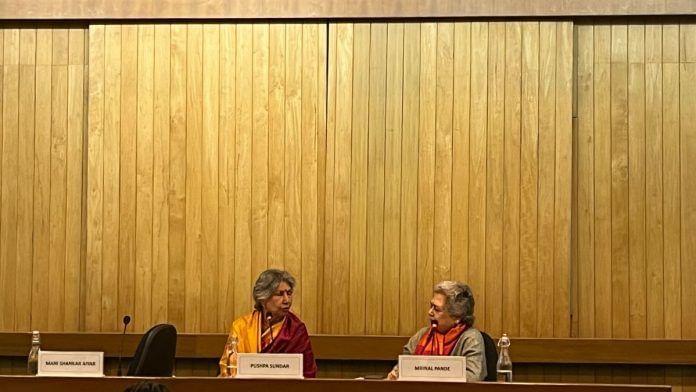New Delhi: Former IAS officer Pushpa Sundar ranked 7th in her 1963 batch. But she was shocked when she went to the Foreign Secretary to learn more about the service.
“He said we don’t want women in the foreign services,” said Sundar at the launch of her book Beyond the Heaven-Born Service: My Journey from the IAS to Philanthropy. It’s something she remembers half a century later.
Delhi’s India Habitat Center was filled with retired IAS officers and professors, all there to listen to Sundar, who was in conversation with journalist and author Mrinal Pande.
The cold evening began with an introduction by Congress leader and former career civil servant Mani Shankar Aiyar. They were both in training together. He shared the experience of the old days—all that made Pushpa a figure of admiration during her IAS training.
“Pushpa’s intelligence and grace were matched only by her humility and dedication. Her partnership with Sanjiv Sundar was a testament to what true integrity and service look like, inspiring all of us to aim higher in our own journeys,” said Aiyar, adding that there were only four women in their batch and many men were after them.
For many of Sundar’s batchmates present at the event, this was a trip back to the training days.
The conversation began with Sundar’s upbringing and how difficult it was to grow up in a Brahmin household.
“Growing up in a traditional household, I often felt the weight of expectations, but my grandfather’s encouragement to pursue knowledge gave me the courage to dream beyond societal constraints,” said Sundar.
Sundar went to London to study but she returned to India. She said coming back to India grounded her, she discovered her true purpose.
“My time in London opened my eyes to a world of possibilities, but returning to India was a deliberate choice—to root myself in my heritage and contribute to the land that shaped my identity,” she said.
Also read: ‘Two services for the salary of one’ — the challenges of being the spouse of an IFS officer
IAS to philanthropy
Pushpa Sundar shared her journey from working as a dedicated IAS officer to entering into Indian philanthropy.
“Returning to India was a turning point that shaped my journey from civil service to philanthropy. Studying in India after my time abroad was humbling; it grounded me in the realities of my country and reaffirmed my commitment to creating change from within,” she said.
Mrinal Pande asked Sunder how it was being a woman IAS officer back in the day.
“Many officers have said there were no washrooms and they had to go behind the bushes. How did you manage?” asked Pande.
She said balancing the demands of her career and taking care of her children was difficult, but she managed.
“As a woman, I often had to prove my commitment doubly—both at work and at home—navigating societal expectations and professional pressures simultaneously,” said Sundar.
(Edited by Theres Sudeep)






